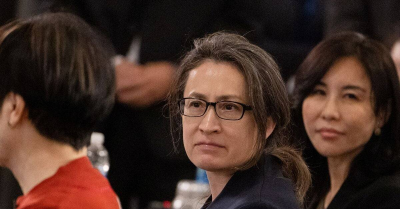Reuters-Taiwans former US envoy well-known in US vilified by China named VP candidate
November 20, 2023 3 min 602 words
这篇报道揭示了台湾总统候选人赖清德选择前驻美代表萧美琴作为副总统候选人的决定。赖清德领先于选举民意调查,而萧美琴在华盛顿广受认可,但被中国指责为分裂分子。这次选举发生在中国不断向台湾施加主权压力的背景下。报道中提到赖清德和萧美琴都被中国视为“独立行动的双簧”,中国强调台湾民众对于两者合作的看法,并进行了军事演习以警告台湾。文章也提到了赖清德团队的准备和对比台湾两大反对党在副总统人选上的争执。整体来说,这篇报道突显了台湾与中国紧张关系下的政治动荡,以及赖清德选择萧美琴的战略意义。
Lai Ching-te, the frontrunner for Taiwan's presidency, named on Monday Taipei's former envoy to the United States as his running mate in January's election, a high-profile diplomat well known in Washington but who Beijing denounces as a separatist.
Lai, vice president and the ruling Democratic Progressive Party's (DPP) presidential candidate, has led in most opinion polls ahead of the election, which is taking place as Taiwan comes under increased pressure from China to accept its sovereignty claim.
His running mate, Hsiao Bi-khim, 52, who had been Taiwan's de facto ambassador to the United States since 2020, has extensive connections in Washington, and had been widely expected to be Lai's running mate.
In a post on his Facebook page, Lai said he would formally present Hsiao as his running mate on Monday afternoon. Taiwan's foreign ministry said it had accepted her resignation.
"I believe that Bi-khim is definitely an excellent person when it comes to Taiwan's diplomatic work today, and she is a rare diplomatic talent in our country," Lai added.
Rupert Hammond-Chambers, president of the U.S.-Taiwan Business Council who has known Hsiao since the 1990s, said she was a "formidable politician", and would add much needed diplomatic and security heft to Lai's ticket.
"Bi-khim's relationships in D.C. will be invaluable to a President Lai, if he is elected, she's going to bring all of those relationships into his government and he doesn't have those," he told Reuters.
The United States, as with most countries, has no formal ties with Taiwan, but is the island's most important international supporter and arms supplier.
Like Lai, Hsiao is despised by China, which has twice placed sanctions on her, most recently in April, saying she was an "independence diehard".
China's Taiwan Affairs Office on Wednesday referred to Lai and Hsiao as an "independence double act", adding that Taiwan's people were "very clear" about what their partnership meant for the "situation in the Taiwan Strait". It did not elaborate.
China carried out military drills around Taiwan in August, after Lai returned from a brief visit to the United States, in what the Chinese military said was a "serious warning against Taiwan independence separatist forces colluding with external forces to provoke".
The DPP champions Taiwan's separate identity from China. The DPP-led government says only Taiwan's people can decide their future, and it has repeatedly offered talks with Beijing but been rebuffed.
The DPP's smooth handling of its vice presidential nominee stands in contrast with efforts by Taiwan's two main opposition parties to agree on a joint ticket. Their negotiations have stalled.
The largest opposition party, the Kuomintang (KMT), which traditionally favours close ties with Beijing, is locked in a dispute with the smaller Taiwan People's Party about which of their candidates should run as president and which as vice president after initially agreeing to work together.
The deadline to register presidential candidates with the election commission is Friday.
Lai, writing on Facebook, pointed to the "turmoil" in the opposition camp.
"In contrast, the team I lead is definitely a fully prepared and tested one," he said.
Hsiao was born in Japan to a Taiwanese father and American mother and initially worked in the office of then-president Chen Shui-bian, also from the DPP, and then as a DPP lawmaker.
Unusually in Taiwan, she uses a Taiwanese Hokkien spelling of her name in English to underscore her identity as being Taiwanese and not Chinese.

